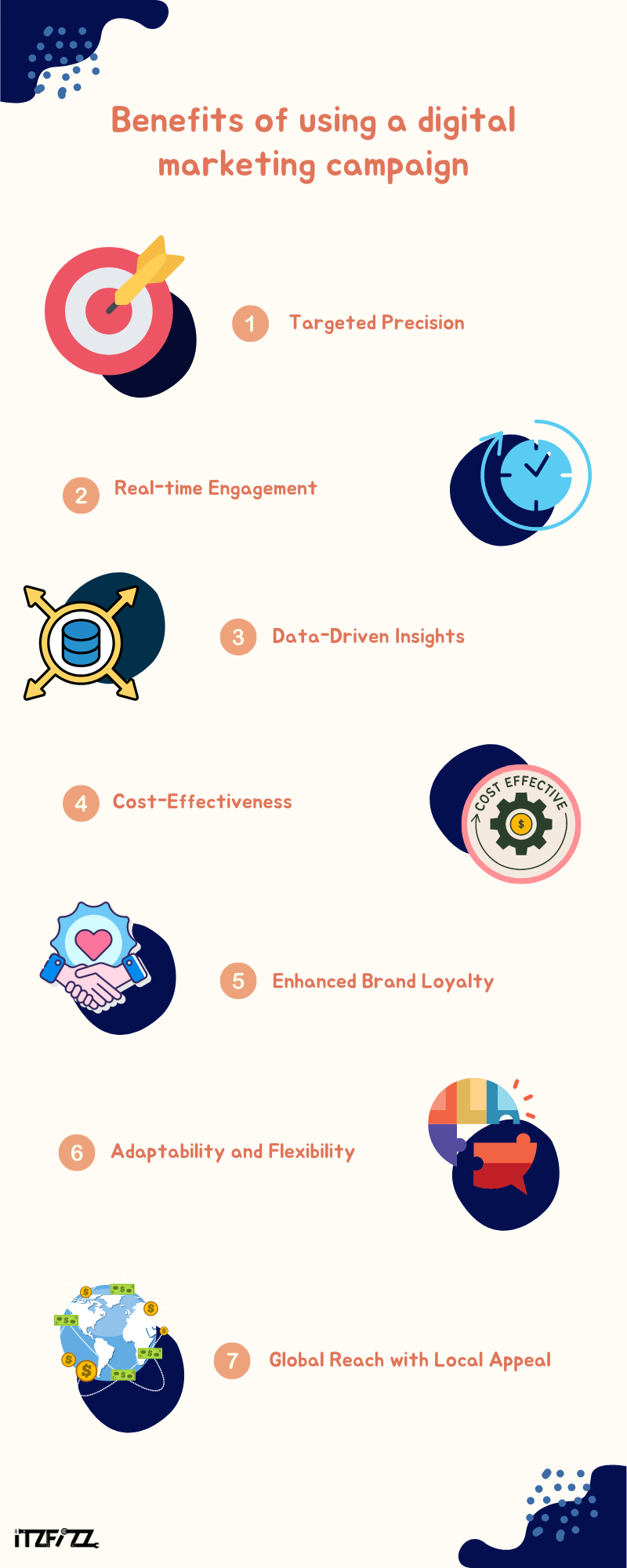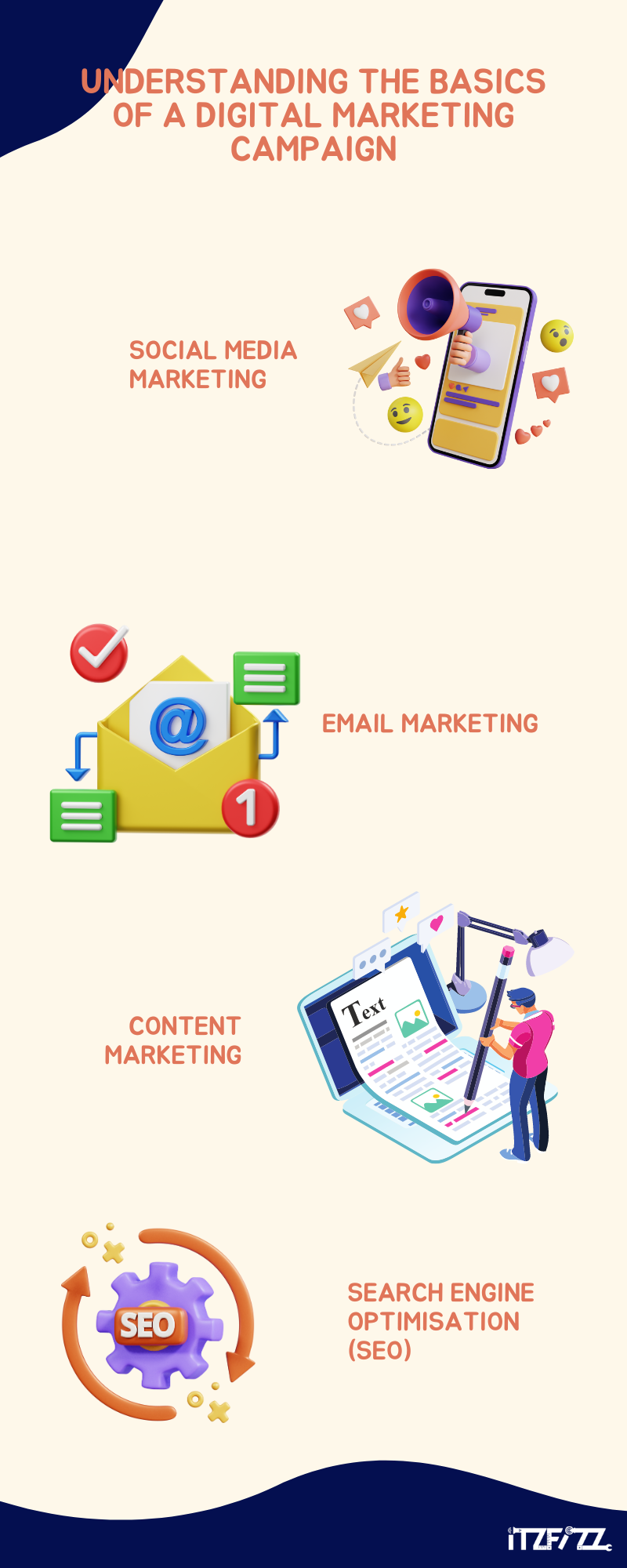Introduction to Digital marketing campaigns
Digital marketing campaigns are crucial in today’s fast-paced digital world, where anyone can easily get attention with a single click. These strategic efforts are what propel firms into the spotlight and help them interact with their target audiences in ways that were unthinkable only a few years ago. They are the driving force behind corporate growth and brand visibility.
Imagine this: a skillfully designed digital marketing campaign serving as the light that directs prospective clients to your door. The effect is revolutionary, increasing brand awareness worldwide and stimulating never-before-seen company expansion. Being unique is becoming essential in today’s cutthroat business environment, and successful digital marketing campaigns are the secret weapon separating the winners from the losers.
As we explore digital marketing campaigns in more detail, we’ll find the tactics and ideas that can improve your brand, have an impact on your target audience, and promote long-term growth. Come along on this adventure with us as we uncover the secrets of effective digital marketing and investigate how it may completely change the course of your brand.
The significance of a digital marketing campaign
A well-designed digital marketing campaign is essential in the fast-paced world of the internet. Let’s examine two crucial elements that highlight the digital marketing campaigns’ significance as we go deeper into their importance.
2.1: Increasing Brand Visibility
1. Global Reach: Reach a wide range of audiences, breaking geographical barriers.
2. Targeted Exposure: Pinpoint your ideal audience with precision, ensuring your message resonates.
3. Brand Recognition: A consistent online presence fosters brand familiarity and trust.
4. Competitive Edge: Stay ahead in the competitive landscape by showcasing your unique value.
2.2: Driving Business Growth
1. Lead Generation: Digital campaigns are potent lead magnets, capturing potential customers.
2. Conversion Catalyst: Move leads through the sales funnel with compelling content and strategic engagement.
3. Measurable Results: Leverage analytics to measure campaign success and refine strategies.
4. Cost-Effective: Compared to traditional methods, digital campaigns often offer a more budget-friendly approach.
In essence, a well-executed digital marketing campaign isn’t just about visibility; it’s a powerhouse driving tangible growth and success for your business.
Benefits of using a digital marketing campaign

There are several benefits when running a digital marketing campaign in the dynamic world of business. Let’s examine the several advantages that influence the game.
- Targeted Precision:
Tailor your message precisely to your audience, ensuring maximum relevance.
Engage with specific demographics, interests, and behaviours for optimal impact. - Real-time Engagement:
Instantly connect with your audience through various digital channels.
Foster two-way communication, building relationships and trust in real-time. - Data-Driven Insights:
Harness the power of analytics to gain invaluable insights into audience behaviour.
Make informed decisions based on concrete data, refining strategies for ongoing success. - Cost-Effectiveness:
Maximise your budget by focusing on channels that yield the best results.
Enjoy a more cost-effective alternative to traditional marketing methods. - Enhanced Brand Loyalty:
Establish a consistent and compelling brand presence across digital platforms.
Build lasting relationships with customers, fostering loyalty and advocacy. - Adaptability and Flexibility:
Swiftly adapt your campaigns based on real-time performance data.
Stay ahead of industry trends and adapt strategies for optimal results. - Global Reach with Local Appeal:
Reach a global audience while maintaining the ability to localise content.
Tailor campaigns to resonate with diverse cultural nuances and preferences.
In essence, a digital marketing campaign isn’t just a promotional strategy; it’s a dynamic tool that empowers businesses with precision, agility, and the ability to build lasting connections in the digital landscape.
Developing a digital marketing strategy
Embarking on a successful digital marketing campaign requires a well-thought-out strategy. Let’s break down the crucial steps involved in developing a strategy that ensures maximum impact.
- Defining Campaign Goals:
Clarity is Key:
Clearly articulate your objectives, whether it’s brand awareness, lead generation, or sales conversion.
Align goals with your overall business objectives for a cohesive approach.
Consider incorporating customer feedback to shape realistic and customer-centric goals. - Establishing Measurable Key Performance Indicators (KPIs):
Quantifiable Metrics:
Identify specific KPIs relevant to your goals, such as website traffic, conversion rates, or social media engagement.
Establish benchmarks to measure success and track progress throughout the campaign.
Regularly gather and analyse customer feedback to adapt and refine your KPIs based on the evolving landscape.
Identifying the Target Audience
In the digital sphere, knowing your audience is critical. Let’s examine the crucial actions for identifying and establishing contact with your prospective customer.
- Conducting Audience Research:
Digging Deep: Utilise tools and analytics to gather data on demographics, online behaviour, and preferences.
Analyse existing customer data to identify patterns and trends.
Incorporate customer satisfaction insights to refine your understanding of the target market. - Creating Buyer Personas:
Humanising Your Audience: Develop detailed personas representing your ideal customers.
Include factors like age, interests, challenges, and online behaviour to tailor your campaign effectively.
Consider incorporating customer feedback to enhance the accuracy of your buyer personas.
Budgeting and Resource Allocation
Ensuring the success of your digital marketing campaign involves smart budgeting and resource allocation. Let’s delve into the strategic steps to manage resources effectively.
- Allocating Resources Effectively
Identifying Assets:
Assess your existing digital assets, including content, design, and technology.
Allocate resources based on the needs of each digital channel and campaign element.
Prioritise elements that contribute to a positive customer experience and foster customer satisfaction. - Determining an Appropriate Budget for the Campaign
Balancing Act:
Evaluate the scope and goals of your campaign to determine a realistic budget.
Consider the costs associated with advertising, content creation, and technology platforms.
Allocate budgetary resources to initiatives that resonate with your target market and contribute to building a base of loyal customers.
By carefully defining goals, understanding your audience, and allocating resources strategically, you lay the groundwork for an online marketing strategy that not only resonates with your target audience but also maximises your return on investment, fosters customer satisfaction, and cultivates a base of loyal customers in your target market. Regularly seeking and incorporating customer feedback ensures your strategy stays customer-centric and aligned with the evolving needs of your prospective customers.
Understanding the Basics of a Digital Marketing Campaign

Now, let’s delve into the fundamental components and channels that constitute a robust digital marketing campaign. We’ll explore the critical elements, including social media, email marketing, content marketing, and search engine optimisation (SEO), while seamlessly integrating the specified keywords.
- Key Components and Channels Involved:
1. Social Media Marketing:
Leverage the expansive reach of social media to connect with a wide range of audiences.
Optimise social media campaigns for mobile devices, enhancing the user experience.
Cultivate a strong social media presence to foster engagement and brand visibility. - Email Marketing:
Utilise the power of email marketing to directly engage with your target market.
tailor email campaigns for mobile devices, ensuring a seamless user experience.
Utilise customer feedback to refine and optimise email content for maximum impact. - Content Marketing:
Develop a diverse range of content tailored for different platforms and devices.
Incorporate SEO tools to enhance online visibility and reach a wider audience.
Collaborate with the marketing team to ensure cohesive messaging across content marketing efforts. - Search Engine Optimisation (SEO):
Implement search engine marketing techniques to enhance online visibility.
Optimise content for mobile devices, recognising the prevalence of mobile marketing.
Prioritise user experience in web design and content to improve SEO performance.
By seamlessly integrating these components and channels, your online marketing campaign will not only reach a wide range of audiences but also prioritise user experience and user interface, adapt to mobile devices, and maintain a strong social media presence. Collaborate closely with your marketing team to ensure consistency across channels and leverage customer feedback to refine strategies for optimal impact.
Crafting Compelling Content
6.1: Importance of High-Quality Content
In the realm of digital marketing efforts, high-quality content reigns supreme. It serves as the cornerstone of a successful content marketing strategy, capturing the attention of a wide audience. Every piece of content should align with the goal of content marketing: providing valuable information that establishes a strong connection with Internet users.
6.2: Tailoring Content to Target Audience Preferences
Understanding the preferences of your target audience is paramount in digital marketing channels. Craft content that resonates on social media platforms, utilising user-generated content for authenticity. Incorporate video marketing to engage a diverse audience, fostering a strong connection with potential customers.
6.3: Utilising Various Content Formats
Diversify your content marketing campaigns with blog posts, videos, and infographics. This multifaceted approach caters to different preferences, ensuring your content is accessible and engaging. Incorporate influencer marketing to amplify your reach, maximising the impact of each piece of content.
Selecting Appropriate Channels
7.1: Evaluating the Most Effective Channels for the Target Audience:
In navigating digital marketing channels, evaluate where your target audience is most active. Optimise your presence on social media platforms, understanding the dynamics of each. Tailor your approach based on user behaviour to effectively reach a wide audience.
7.2: Developing a Multichannel Approach for Maximum Reach:
Diversify your digital marketing efforts by developing a multichannel approach. This ensures maximum reach and engagement across various platforms. Integrate social media marketing and email marketing campaigns seamlessly, aligning with your marketing budget and goals.
Implementing SEO Strategies
8.1: Incorporating Keywords and Optimising Content for Search Engines:
In the realm of SEO, incorporating long-tail keywords strategically is fundamental to digital marketing efforts. Craft high-quality content with valuable information, optimising each piece for search engines. This approach enhances visibility, connecting your content with a wide audience of internet users.
8.2: Building Quality Backlinks to Improve Search Rankings:
Strengthen your modern marketing strategy by building quality backlinks. This SEO tactic improves search rankings, signalling the value and relevance of your content. Foster connections with influencers to enhance your link-building strategy, maximising the impact of your digital marketing channels.
Leveraging Social Media
9.1: Choosing the Right Platforms for the Target Audience:
Selecting the right social media platforms is pivotal to digital marketing efforts. Understand where your target audience is most active and tailor your approach accordingly. Cultivate a strong presence on platforms suited to your content and goals.
9.2: Developing Engaging and Shareable Content:
In social media marketing, the key lies in developing content that is not only engaging but also shareable. Foster a sense of community by encouraging user-generated content, creating a ripple effect that extends your reach to a wide audience.
9.3: Utilising Paid Advertising Options:
Set aside some of your marketing budget for social media platform paid advertising. This strategic investment enhances visibility, ensuring your digital marketing efforts reach a broader audience. Tailor your ads to align with the goals of each campaign, optimising your ROI.
Email Marketing Tactics
10.1: Creating Personalised and Segmented Email Campaigns:
Elevate your email marketing campaign by creating personalised and segmented content. Tailor messages to cater to the specific interests and behaviours of your target audience. This approach establishes a direct connection, enhancing the effectiveness of your digital marketing channels.
10.2: Implementing Automation for Efficiency:
Streamline your email marketing tactics by using SEO automation tools. This efficiency-boosting approach allows for timely and personalised communication, maximising the impact of each email campaign. Align your automation strategy with your marketing budget, ensuring cost-effectiveness and optimal results.
Case Studies and Success Stories
In the realm of digital marketing, real-life success stories provide invaluable insights into effective strategies and tactics. Two stellar examples, UNIQLO’s “Uncover” campaign and Slack’s word-of-mouth marketing strategy, showcase how harnessing digital marketing techniques can yield exceptional results.
UNIQLO’s “Uncover” Campaign:
UNIQLO‘s approach exemplifies the effective utilisation of social media and influencer marketing, key digital marketing tactics. Collaborating with fashion influencers, they generated authentic and relatable user-generated content (UGC), fostering trust among potential customers.
The campaign’s focus on storytelling, unveiling hidden talents and passions, added an emotional connection, making it memorable. The multi-channel approach, spanning social media, online experiences, and pop-up events, ensured a broader reach, demonstrating the power of diverse digital marketing tools.
Slack’s Word-of-Mouth Marketing Strategy:
Slack’s success lies in tapping into user loyalty through word-of-mouth marketing, a potent digital marketing technique. Leveraging user referrals and testimonials, they harnessed the influential power of recommendations from trusted sources. The strategy created a sense of community among users, fostering brand loyalty.
Importantly, Slack made user feedback an integral part of their process, utilising testimonials and referrals to tailor both their marketing and product development, showcasing the symbiotic relationship between digital marketing tactics and user feedback.
Extracting Valuable Lessons and Takeaways
Both campaigns underscore essential principles for successful digital marketing, aligning with overarching marketing goals:
- Understanding Your Target Audience:
Recognising interests, needs, and online behaviour is foundational for crafting resonant messaging.
This principle ensures that digital marketing efforts are tailored to meet the specific requirements of the target audience. - Creating Engaging Content:
Compelling content, whether in the form of UGC, storytelling, or user testimonials, captivates audiences.
Engaging content is a linchpin in achieving marketing goals, drawing in a larger audience, and fostering brand advocacy. - Utilising Multiple Channels:
A multi-pronged approach across various online platforms is essential for increasing reach and amplifying the marketing message.
Leveraging diverse digital marketing tools ensures that the campaign is well-rounded and reaches a wider audience. - Building Trust and Relationships:
Focusing on establishing genuine connections fosters loyalty and brand advocacy.
Trust is a currency in digital marketing, and building strong relationships contributes to the long-term success of the campaign.
In conclusion, these case studies highlight that successful digital marketing campaigns are rooted in understanding the audience, creating engaging content, utilising diverse channels, and building trust. Constant analysis, adaptation, and integration of user feedback are pivotal for navigating the ever-evolving online landscape, achieving marketing goals, and resonating with a larger audience.
Monitoring and Analysing Performance
In the digital marketing landscape, the ability to monitor and analyse performance is crucial for ongoing success. Let’s explore the importance of utilising analytics tools, specifically Google Analytics, to track campaign progress and make data-driven adjustments for continuous improvement.
Utilising Analytics Tools to Track Campaign Progress:
Google Analytics stands as a powerhouse for monitoring digital marketing campaigns. Its robust features enable a comprehensive examination of organic traffic, user behaviour, and engagement metrics. Tracking key performance indicators (KPIs) allows marketers to gauge the effectiveness of their strategies, providing invaluable insights into audience interactions across various channels.
Making Data-Driven Adjustments for Continuous Improvement:
Google Analytics empowers marketers to make informed, data-driven adjustments to their campaigns. Analysing the data gleaned from the platform enables a nuanced understanding of what works and what requires refinement. This iterative process of continuous improvement ensures that digital marketing efforts remain agile, adapting to evolving trends and audience behaviours, for sustained success. Google Analytics is not just a tool; it’s a compass guiding marketers towards optimised strategies and enhanced campaign performance.
Conclusion
In the ever-evolving landscape of digital marketing, success hinges on a strategic blend of key elements. A successful digital marketing campaign necessitates a clear definition of goals, an intimate understanding of the target audience, and the creation of compelling, diverse content across multiple channels. Leveraging SEO strategies, social media, and email marketing tactics enhances digital presence while monitoring performance through tools like Google Analytics ensures continuous refinement.
As we conclude, remember the core principles: understand your audience, create engaging content, leverage diverse channels, and build trust. Implementing these strategies, informed by real-life success stories, paves the way for remarkable results. Whether you’re a seasoned marketer or just starting, the dynamic nature of digital marketing offers boundless growth opportunities. Embrace the journey, adapt with insights, and witness the transformative impact of a well-crafted digital marketing strategy on your brand’s success. It’s time to navigate the digital landscape with confidence and achieve remarkable results.
Frequently Asked Questions (FAQ) :
Launching a digital marketing campaign requires a plan. First, define specific goals that are in line with the overarching objectives of the firm. To comprehend client preferences, do in-depth audience research. Select the right digital channels, such as SEO, email, and social media. Create engaging content that is consistent across platforms and caters to the intended audience. Use analytics software to track performance and make data-driven changes for ongoing development.
Digital marketing campaigns using several channels are essential for increasing effectiveness and reach. Businesses interact with audiences across multiple channels by strategically utilising diverse platforms like email, social media, and SEO. By maximising visibility, engaging a larger audience, and ensuring a consistent brand presence, this strategy fosters a whole brand experience.
In digital marketing campaigns, businesses have to deal with issues like cybersecurity, online reputation management, and algorithm adaptation. Common challenges include content quality, staying up-to-date with technical changes, and finding a balance between organic and paid solutions.
Future digital marketing campaigns should focus more on the user experience and become more personalised. Immersion technology, artificial intelligence, and augmented reality will all become increasingly important. Consumer preference for socially conscious brands will also impact marketing, along with sustainability and ethical factors.
A digital marketing campaign only uses online platforms, whereas a general marketing campaign uses traditional media like print and television. Digital campaigns offer a more dynamic and interactive approach by utilising data-driven insights, precise targeting, real-time interaction, and email marketing through the use of analytics tools, social media, SEO, and email marketing.
Every type of campaign reaches consumers through a variety of digital platforms while meeting particular objectives.
1. Search Engine Optimisation (SEO) Campaigns: Proper content optimisation increases online visibility.
2. Social Media Marketing Campaigns: Using Facebook, Instagram, and Twitter to communicate and engage with audiences.
3. Email marketing campaigns: targeting audiences with segmented and personalised emails.
4. Content marketing campaigns aim to draw in and keep viewers by producing and disseminating informative content.
5. Online advertisements that need payment only when consumers click are known as pay-per-click (PPC) campaigns.
6. Influencer Marketing Campaigns: Working together to market goods or services through influencers.
7. Video Marketing Campaigns: Producing and disseminating videos to efficiently communicate messages.
8. Affiliate Marketing Campaigns: Collaborating with affiliates in exchange for a commission to market goods.










